

Lee Jae-myung of South Korea's liberal Democratic Party was elected president on June 4.
President Yoon Suk-yeol was removed from office on April 4 after the country's Constitutional Court, in a unanimous decision, upheld a parliamentary vote to impeach him over the Dec 3 martial law decree.

A South Korean court said on Wednesday that it would deliver its verdict in former president Yoon Suk-yeol's insurrection trial on Feb 19, after the special counsel demanded the death penalty.
The Seoul Central District Court made the announcement early in the morning following a 17-hour final hearing session, Yonhap News Agency reported.
Yoon's declaration of martial law in December 2024 was "a serious destruction of constitutional order by anti-state forces", the prosecutors said. Yoon, as the ringleader of the incident, and his key accomplices must be severely punished, they said.
The special counsel team said Yoon used the state of emergency as a tool to monopolize power and secure long-term rule, which directly and fundamentally infringed on national security and the freedom of the people.
In addition, Yoon had shown no sincere reflection or acknowledgement of his responsibility in the incident, the prosecutors said, as they requested the court to impose the maximum penalty.
Upon hearing the request, Yoon showed a faint smile. He then made a final statement, reiterating his innocence.
"A president's exercise of constitutional emergency powers to protect the nation and uphold the constitution cannot be an insurrection," he said.
The martial law declaration was aimed at informing the public of a national emergency, rather than imposing a military dictatorship that suppressed the people, he said.
The Blue House, the office and residence of current President Lee Jae-myung, said on Tuesday that it believes the judiciary will make a ruling in accordance with law and principles, and in a manner that meets public expectations.
Ji Gwi-yeon, chief judge of the Seoul Central District Court, said the court will judge according to the Constitution, the law and the evidence.
Cho Hee-kyoung, a law professor at Hongik University in Seoul, told China Daily that the special counsel's request for death penalty is symbolic and also a serious legal argument.
While South Korea is classified as "abolitionist in practice" as it has not carried out any death penalty since 1997, Cho said it remains the statutory maximum punishment for insurrection.
"Yoon is charged with leading an insurrection (based on Article 87 of the Criminal Act)," she said. "Had the prosecution requested anything less, it would have been a dereliction of duty and a signal that they did not view the destruction of constitutional democracy as a capital offense."
Cho said she expects the court to pass a sentence of life imprisonment, though a death sentence cannot be ruled out completely.
"As insurrection is a rare crime not detailed in standard sentencing guidelines, the court will look at historical precedents and statutory law," she said. Yoon had maintained his innocence, which could serve as an aggravating factor, she added.
In 1996, former president Chun Doo-hwan was given the death penalty for seizing power in a 1979 coup and over the military's violent suppression of Gwangju democratization movement in 1980. But his sentence was later commuted to life imprisonment.
kelly@chinadailyapac.com
SEOUL -- South Korean police on Tuesday raided the office of a special counsel in charge of former impeached president Yoon Suk-yeol's insurrection and other crimes, according to Yonhap news agency.
The special investigation headquarters under the National Police Agency sent investigators to the office in a bid to seize materials relevant to allegations that the justice ministry attempted to secure a detention space in correctional facilities during the short-lived martial law imposition in December 2024.
The police were quoted as saying that the raid was related to charges against the former head of the correctional service under the justice ministry for engaging in critical duties for the insurrection.
The police special investigative body had continued investigations into Yoon's insurrection and other cases following the conclusion of probes by special counsels.
The special counsel found that the former correctional service chief checked the detention capacity in the Seoul capital area during the martial law imposition under the instructions of Park Sung-jae, former justice minister indicted on charges of his involvement in key missions for the insurrection.
The emergency martial law was declared by Yoon on the night of Dec. 3 in 2024, but it was revoked hours later by the National Assembly.
The constitutional court upheld a motion to impeach Yoon in April last year, officially removing him from office.
The ousted leader was indicted under detention in January 2025 as a suspected ringleader of insurrection.
SEOUL — A special counsel in the Republic of Korea on Monday indicted former president Yoon Suk-yeol on charges of "benefiting the enemy".
A spokesperson for Cho Eunsuk, special counsel leading the investigation into Yoon's insurrection and other charges, told a news briefing that the independent counsel team charged Yoon with "aiding the enemy and abuse of power".
A former defense minister and a former counter-intelligence commander were also indicted on the same charges.
The spokesperson noted that Yoon undermined the military interests of the ROK by increasing the risk of armed conflict between the two Koreas, with the aim of creating conditions for a martial law declaration.
Prosecutor Park Ji-young told reporters on Monday that Yoon and others "conspired to create conditions that would allow the declaration of emergency martial law, thereby increasing the risk of inter-Korean armed confrontation and harming public military interests".
She added that compelling evidence had been found in a memo written by Yoon's former counter-intelligence commander in October last year, which pushed to "create an unstable situation or seize an arising opportunity".
There were no immediate public responses from Yoon.
Yoon plunged the ROK into a political crisis when he sought to subvert civilian rule in December last year, sending armed soldiers to parliament in a bid to stop lawmakers from voting down his martial law declaration.
The ousted leader was apprehended in the presidential office on Jan 15 and was indicted while in detention on Jan 26 as a suspected ringleader of insurrection.
He was released on March 8, as prosecutors decided not to appeal the court's approval of his release, but he was taken into custody again on July 10.
The constitutional court upheld a motion to impeach Yoon on April 4, over his botched bid for martial law last December, officially removing him from office.
Xinhua - Agencies
SEOUL -- Kim Keon-hee, wife of South Korea's former ousted president Yoon Suk-yeol, on Thursday arrived at a special counsel's office to be questioned over corruption allegations involving the presidential couple.
A prison van carrying Kim arrived at the office in central Seoul at around 9:53 am local time (0053 GMT) from the Seoul Southern Detention Center in southwestern Seoul, a live broadcast showed.
Kim has been detained since a Seoul court issued a detention warrant against her on Tuesday night, requested by independent counsel Min Joong-ki, leading the investigation into the corruption charges.
It marked the first time in the country's constitutional history that a presidential couple was simultaneously brought into custody.
Yoon has been held at a separate detention center since July 10 on insurrection charges over his short-lived martial law imposition last December.
Kim was suspected of participating in a stock price manipulation from 2009 to 2012, interfering with the nomination of candidates in the 2022 parliamentary by-elections and the 2024 general elections, and receiving luxury gifts from the Unification Church in exchange for business favors.
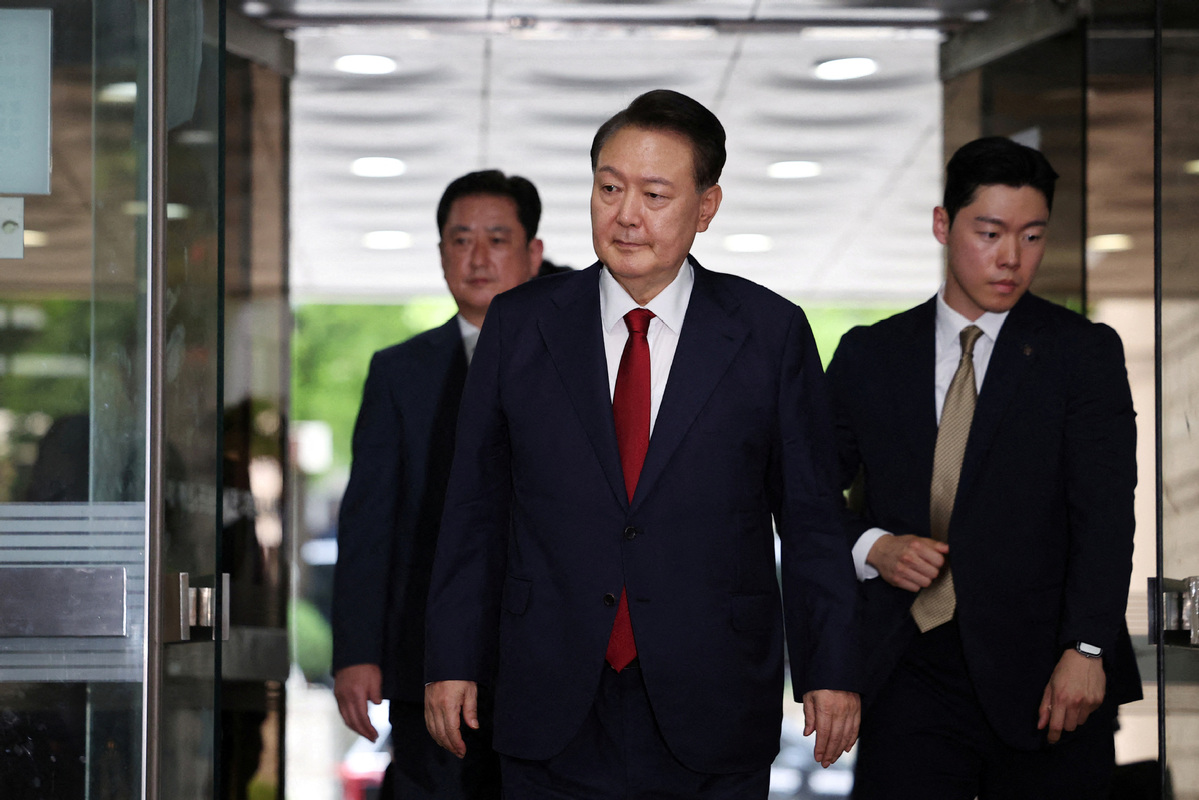
SEOUL — Former South Korean president Yoon Suk-yeol was indicted for abuse of power on Saturday over his ill-fated imposition of martial law last year, as investigators widened an insurrection probe.
Yoon plunged South Korea into a political crisis when he sought to subvert civilian rule on Dec 3, sending troops to parliament in a bid to prevent lawmakers voting down his martial law declaration.
He became the country's first sitting president to be taken into custody when he was detained in January after resisting arrest for weeks, using his Presidential Security Service to thwart investigators.
Yoon was released on procedural grounds in March, even as his trial on insurrection charges continued.
Earlier this month, he was detained again after an arrest warrant was issued over concerns he might destroy evidence in the case.
The prosecution "indicted former president Yoon Suk-yeol on charges including abuse of power and obstruction of special official duties", prosecutor Park Ji-young told reporters on Saturday.
Park said Yoon also did not follow the required procedure to declare martial law, including holding a meeting with all cabinet members of the government.
Yoon was also charged with "drafting and discarding a false document" that stated the prime minister and defense minister had endorsed martial law.
He has refused to attend questioning since he was detained, but appeared in court on Friday at a hearing to argue for his warrant to be canceled.
The former leader's legal team told reporters that Yoon defended himself for more than 30 minutes, and mentioned his "limited physical mobility and the challenges he was facing".
The court denied the request.
AGENCIES VIA XINHUA
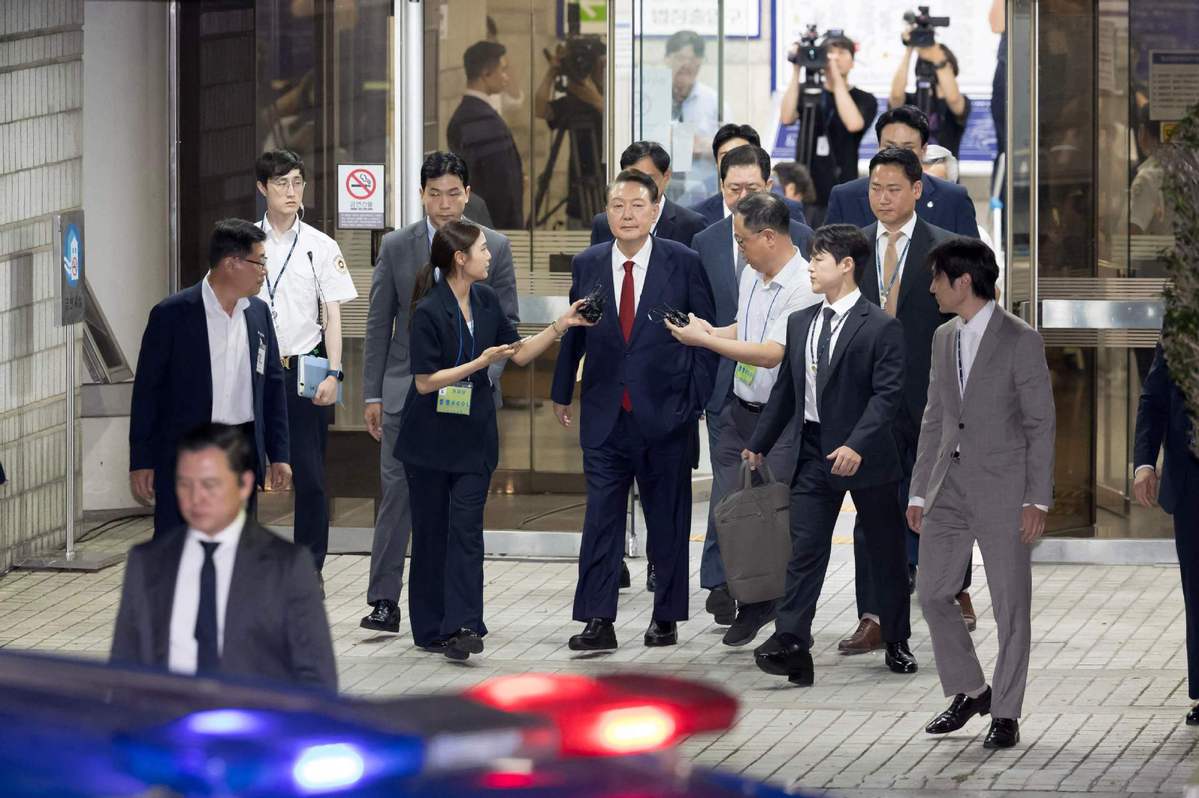
Former South Korean president Yoon Suk-yeol was arrested for the second time on July 10 after a court issued a warrant to place him in custody over his short-lived martial law declaration in December.
The Seoul Central District Court accepted the issuance request from Cho Eun-suk, independent counsel leading the investigation into Yoon's insurrection and other charges, saying Yoon was feared to destroy evidence, according to Xinhua.
The special counsel team's spokesperson said key charges specified in the warrant included the obstruction of justice, abuse of power, and writing a bogus official document.
The team also accused Yoon of violating the rights of cabinet members by excluding the majority of them from a key meeting before declaring martial law on Dec 3.
The special counsel team launched its investigation on June 18. It sought the detention to keep Yoon in custody for an extended period of time, or at least 20 days.
A separate warrant to arrest Yoon for up to 48 hours was sought last month, but it was dismissed by the Seoul court.
Yoon was first arrested in January before he was officially impeached and removed from office in April over the declaration of martial law. He was released in March after a court accepted his request to cancel the arrest and the prosecutors decided not to appeal against the release approval.
Following the latest arrest, Yoon did not attend his insurrection trial on July 10, saying it was due to health reasons. It was the first time he was absent from the trial.
If convicted of insurrection, Yoon could face a maximum penalty of life in prison or death, according to Yonhap News Agency.
kelly@chinadailyapac.com
SEOUL -- South Korea's court issued a warrant to detain former president Yoon Suk-yeol, sought by special counsel investigating Yoon's short-lived martial law imposition, the special counsel team's spokesperson said early Thursday.
The Seoul Central District Court accepted the issuance request from Cho Eun-suk, independent counsel leading the investigation into Yoon's insurrection and other charges, saying Yoon was feared to destroy evidence.
The charges specified in the warrant included the obstruction of justice, abuse of power and writing a bogus official document, the spokesperson noted.
He is also accused of violating the rights of cabinet members by excluding most of them from a key meeting ahead of his Dec 3 martial law declaration, according to local media reports.
Additional charges include ordering the dissemination of false statements to foreign media, instructing aides to obstruct his arrest in January, and ordering the deletion of call records from secure phones, reports said.
The special counsel team, which launched its investigation on June 18, sought the detention warrant to keep Yoon in custody for an extended period of time, or at least 20 days.
A separate warrant to arrest Yoon for up to 48 hours was sought last month, but it was dismissed by the Seoul court as Yoon showed his willingness to be questioned.
Yoon rejected the third police call on June 19 to appear for questioning over his charges of ordering the presidential security service to block the attempt in January to arrest him and to delete information on security phones offered to three military commanders.
Yoon was apprehended in presidential office on Jan. 15 and was indicted under detention on Jan. 26 as a suspected ringleader of insurrection, but he was released on March 8 as prosecutors decided not to appeal against the court's release approval.
The constitutional court upheld a motion to impeach Yoon on April 4 over his botched martial law bid last December, officially removing him from office.
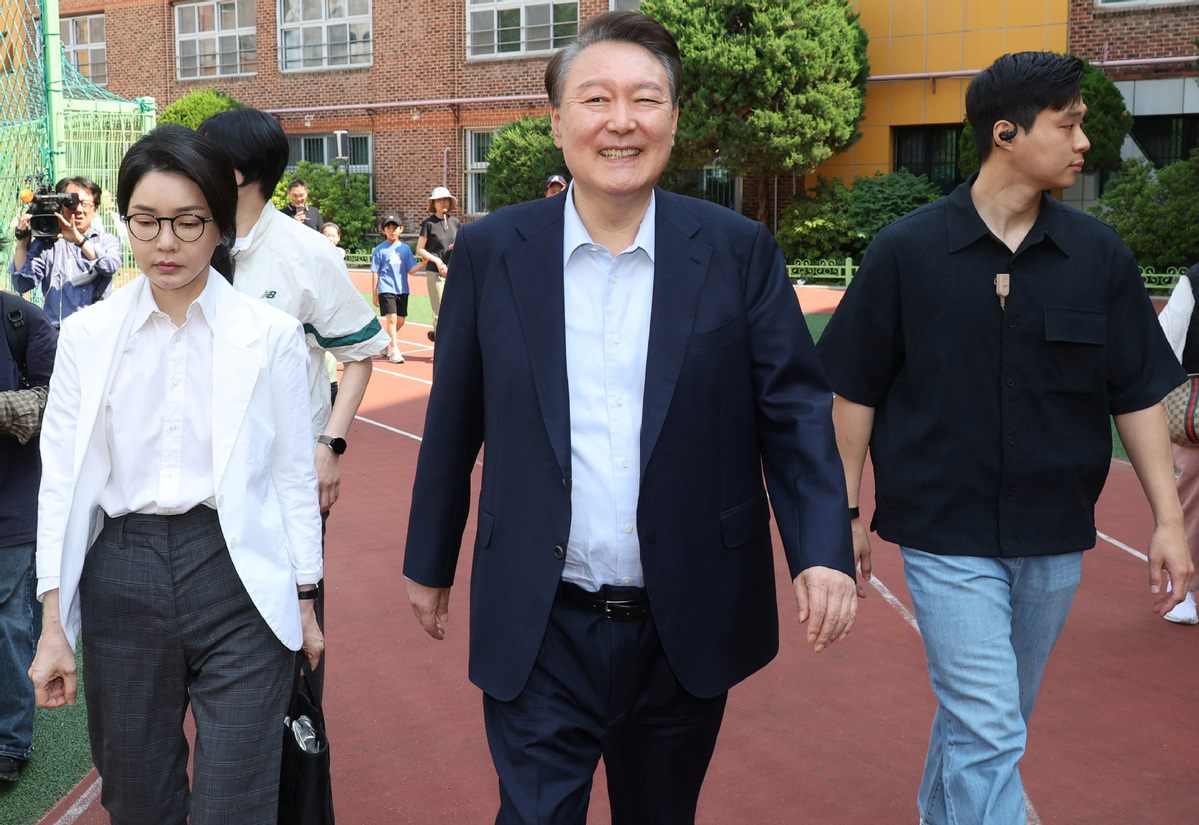
SEOUL -- South Korea's parliament on Thursday passed bills to appoint special counsels and probe the ousted president Yoon Suk-yeol's insurrection charge and scandals involving his wife, Kim Keon-hee.
Of the 198 National Assembly lawmakers attending the parliamentary plenary session, 194 voted for the bills with three dissents and one abstention.
Under the bills, the newly elected President Lee Jae-myung is required to appoint an independent counsel per case among two candidates recommended by the ruling liberal Democratic Party and the left-leaning Rebuilding Korea Party.
Subject to the special investigation will be insurrection charges against Yoon, who was removed from office in April following his botched martial law bid last December.
Scandals of Yoon's wife to be investigated will be allegations of stock price manipulation, receiving luxury handbags, interference in candidate nominations for the 2022 by-elections and the 2024 parliamentary elections and opinion polls rigging during the 2022 presidential election.
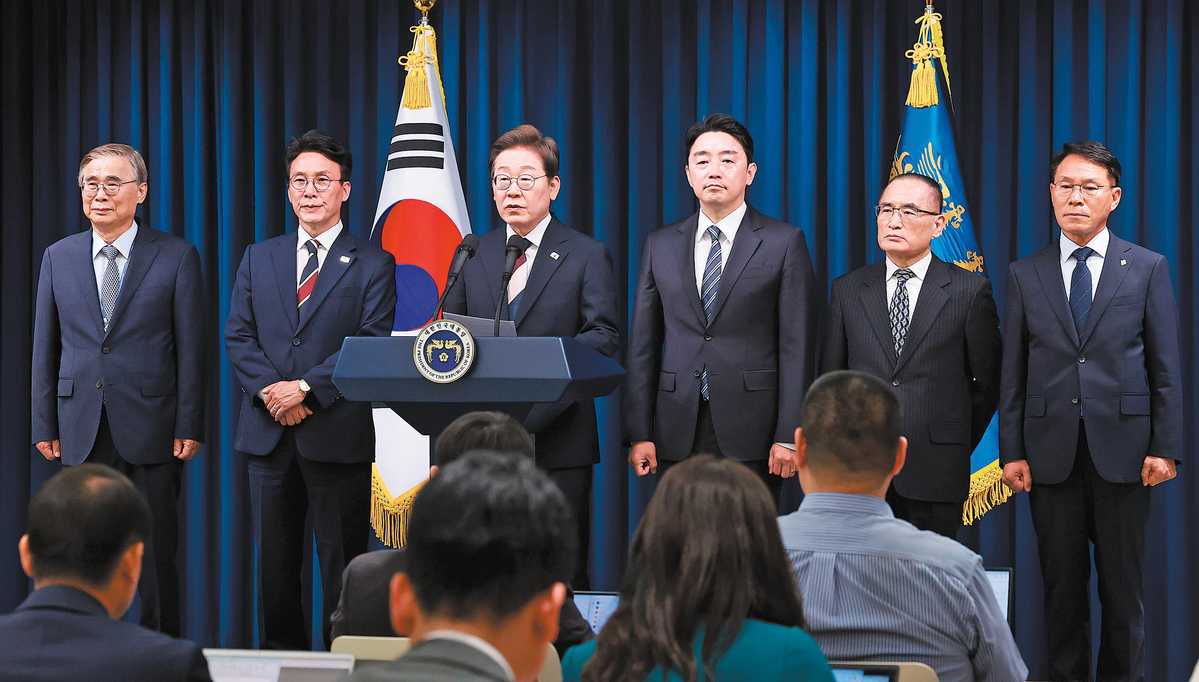
The new president of the Republic of Korea Lee Jae-myung stressed national unity and economic revitalization in his inauguration speech on Wednesday, aiming to put the nation back on track after months of chaos and uncertainty following his predecessor's ouster over a martial law attempt.
The new leader faces a daunting task due to a deep political divide in the nation, and challenges on multiple other fronts, including diplomacy and trade, with US tariffs among the big problems, experts said.
"It is time to revive a nation pushed to the brink, restore growth, and create a future where everyone can live happily," said Lee, in his first address to the nation as the country's 21st president after taking the oath of office at the National Assembly in Seoul.
Wearing a multicolored tie that comprised white, red and blue, which is different from the blue tie he had kept wearing during the campaign, Lee said he will become the "president for all" who embraces and serves every citizen regardless of who they supported in the election.
Lee, a former human rights and labor lawyer, won Tuesday's presidential election with 49.42 percent of the vote, beating the 41.15 percent garnered by Kim Moon-soo, candidate of the conservative People Power Party, according to Yonhap News Agency.
Since the snap election was held to fill a vacancy in the top office following the impeachment of former president Yoon Suk-yeol over his short-lived martial law decree, Lee began his single five-year term at 6:21 am on Wednesday after the National Election Commission confirmed his victory in the election.
Turnout among the 44.39 million eligible voters reached 79.4 percent in the election, marking the highest in 28 years.
In his speech, Lee said he will pursue a fair and inclusive government, while adopting a "pragmatic and market-oriented" approach to encourage entrepreneurship and innovation.
An emergency task force to tackle economic challenges was formed after he took office.
On security, Lee said he will open communication channels with the Democratic People's Republic of Korea, with an aim of fostering peace on the Korean Peninsula through dialogue and cooperation.
Though Lee mentioned "unity" multiple times in his speech, his election victory will not mean the end of the political divide in the ROK, said Hong Sung-gul, a professor at the School of Public Administration and Public Policy of Kookmin University in Seoul.
Fierce competition
"There will be fierce competition between the ruling and opposition parties," Hong told China Daily.
Since Lee failed to secure an absolute majority of votes and won the election with a gap of less than 10 percent, a margin much smaller than expected, there is a glimpse of hope for the conservatives to counter the president, said Bong Youngshik, a visiting professor of Yonsei University in Seoul.
Lee garnered 17.3 million votes, which was the highest in a presidential election. But he did not break the percentage record set by former conservative president Park Geun-hye, who gained 51.55 percent and 15.77 million votes in 2012.
The fact that Lee is still facing legal charges will be an Achilles' heel for the president that the conservative party will focus on, Bong told China Daily.
According to the Constitution of the ROK, a sitting president is immune from criminal prosecutions except for charges of insurrection or treason. But whether that applies to a trial that begins before a president is elected has sparked debate within the country.
Lee "might get himself exempted from prosecution if the National Assembly passes the law to nullify all the charges without trial", said Bong. "But doing so would exacerbate his image of not being clean on the rule of law."
As the ROK is also facing challenges in tariff talks with the United States, Hong of Kookmin University said it will not be easy for the new government to make the situation different because the US administration did not show any willingness to change its original stance.
Meanwhile, a formal inauguration ceremony will be held on July 17, when the ROK marks Constitution Day, according to the presidential office.
kelly@chinadailyapac.com
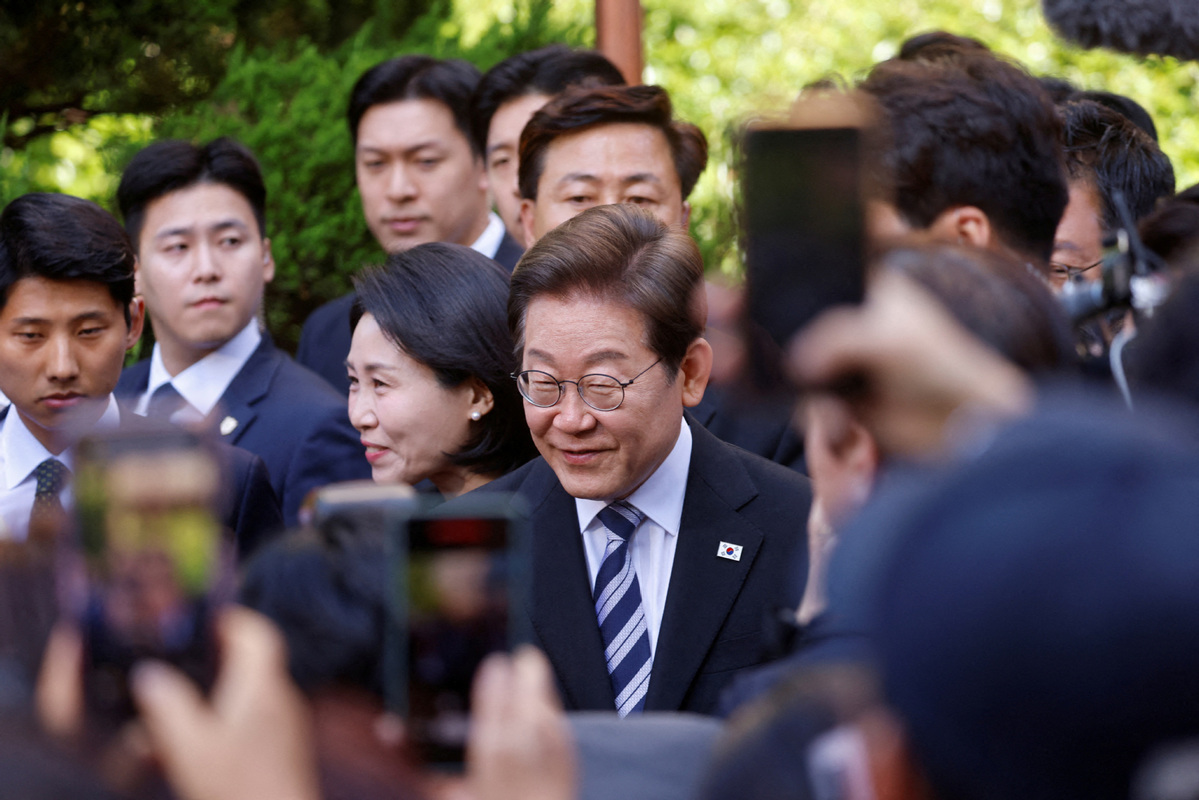
Lee Jae-myung, candidate of the liberal Democratic Party of the Republic of Korea, formally began his presidential term on June 4 morning after winning the election the previous day.
Lee won the June 3 election with 49.42 percent of the final vote, defeating the 41.15 percent of Kim Moon-soo, candidate of the conservative People Power Party, by 8.27 percentage points, according to the ROK's National Election Commission.
A total of 79.4 percent of the 44.39 million eligible voters had cast their ballots in the snap election triggered by the removal of former president Yoon Suk-yeol over his botched martial law.
It was the highest rate in 28 years since the 1997 election, when the turnout was 80.7 percent, according to the NEC.
Lee garnered 17.3 million votes, which was the highest number of votes in a presidential election and surpassed Yoon's record of 16.4 million votes in the 20th presidential election in 2022.
But it did not break the vote rate record set by former president Park Geun-hye, who gained 51.55 percent in 2012.
Since the snap election was held to fill a leadership vacancy, Lee swore in immediately without a transition period after the NEC confirmed the final results.
In a speech at 1 am June 4, when the majority of votes were counted, Lee vowed to restore Constitutional order, promote national unity, and prioritize economic revival.
He also said he aims to stabilize the relationship with the Democratic People's Republic of Korea, prioritizing dialogue instead of confrontation.
kelly@chinadailyapac.com
SEOUL -- Lee Jae-myung was sworn in as South Korea's new president on Wednesday after formally beginning his single five-year term earlier in the day.
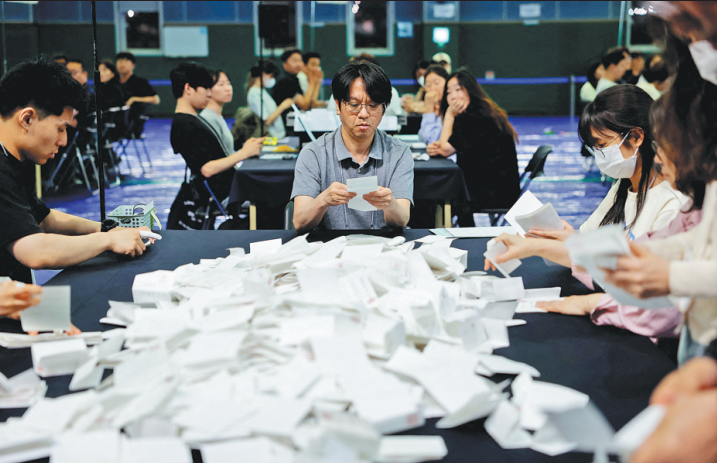
More than 35 million South Korean voters cast their ballots on Tuesday to elect a new President with liberal candidate Lee Jae-myung emerging as the most likely winner in exit polls.
In an election that aimed to end months of political vacuum following former president Yoon Suk-yeol's botched bid to impose martial law, the voter turnout was 79.4 percent, compared with 77.1 percent in 2022, tentative results from the National Election Commission showed on Tuesday.
With 45 percent of the votes counted at 11:52 pm, Lee of the opposition Democratic Party won 49.10 percent and his archrival Kim Moon-soo of the conservative People Power Party garnered 42.55 percent, according to the National Election Commission.
Local broadcaster JTBC and three terrestrial broadcasters said on Tuesday that Lee would be elected president with certainty.
Lee made a short speech to supporters before making his way to the parliamentary building.
The presidential race involved five candidates after two dropped out during the campaigning phase, with Lee and Kim being the frontrunners.
This is Lee's second showing as a presidential candidate. In 2022, he lost to Yoon by 0.7 percentage points, the narrowest margin in South Korean history.
Kim is a former labor minister in the Yoon administration.
The snap election came exactly six months after Yoon made a martial law declaration that plunged the country into political turmoil. He was suspended from duty after being impeached by the Parliament in December, and was ousted in April by the Constitutional Court.
Yoon and his wife, Kim Keon-hee, accompanied by security personnel, cast their ballots at a polling station in Seoul in the morning. They did not answer questions from the media.
"Through today's election on June 3, South Korea will overcome the destruction of democracy that began on Dec 3 in accordance with the Constitution and the rule of law," National Assembly Speaker Woo Won-shik wrote on Facebook after the voting.
Woo said he hopes South Korea will return to the path to stability and prosperity after the election.
In the live TV broadcast, Democratic Party members erupted in applause and cheers after the voting wrapped up, while members of the People Power Party remained calm.
Because the snap election was caused by a leadership vacancy, the new president will immediately begin his term after the National Election Commission confirms the voting results on Wednesday morning, without the 60-day transition period, Yonhap News Agency reported.
The inauguration ceremony will be held briefly at the National Assembly around noon, during which the new president will deliver the inauguration speech and announce the new administration's policies.
The incoming administration will have to deal with a series of political and economic challenges.
The country's GDP growth is projected to weaken to 1 percent this year before picking up to 2.2 percent next year, according to a report published by the OECD on Tuesday.
"Increased tariffs and uncertainty are set to hold back export growth and weaken business investment," the report said, adding that a prolonged slowdown in key trading partners and spiraling protectionism could further strain South Korea's trade-dependent economy.
Despite a bilateral free trade agreement since 2012, South Korea is facing a 25 percent "reciprocal tariff" by the United States, together with sectoral tariffs such as the new 50 percent import taxes on steel and aluminum.
South Korea has agreed with the US to reach a "July package" deal on trade after the new administration is formed.
Compared with other major economies, the cumulative negative effect of US tariffs on South Korea's GDP growth for 2025-26 is expected to be among the most severe, Kim Jinwook, an economist at Citigroup, told The Korea Herald.
In an interview with Arirang News, voter Shin Soo-hyun said he hopes the election winner can keep at least one of his campaign pledges.
Xinhua contributed to this story.
kelly@chinadailyapac.com
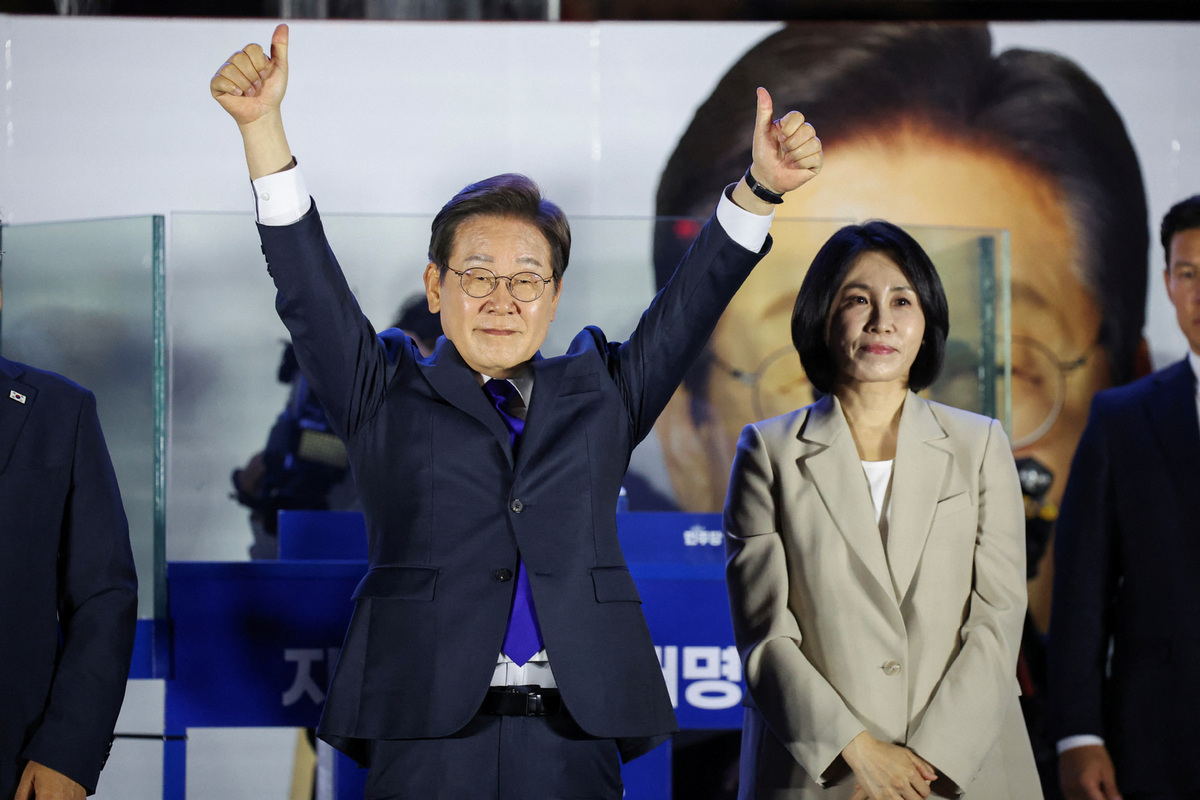
SEOUL -- Lee Jae-myung of South Korea's majority liberal Democratic Party was elected president, the ongoing vote count by the National Election Commission showed on Wednesday.
With 94.4 percent of the votes counted after midnight, Lee won 48.8 percent and his major rival Kim Moon-soo of the conservative People Power Party took 42.0 percent, the National Election Commission data showed.
Even if all the remaining uncounted votes go to Kim, Lee will win the presidential by-election, confirming his victory.
Local broadcaster JTBC and three terrestrial broadcasters including KBS, MBC and SBS forecast earlier that Lee was certain to be elected the country's 21st president.
Preliminary voter turnout reached 79.4 percent, marking the highest in 28 years since the voting rate recorded 80.7 percent in 1997.
Out of about 44.39 million eligible voters, some 35.24 million cast their ballots at 14,295 polling stations across the country.
The voter turnout, which included those who participated in early voting last Thursday and Friday, was up from 77.1 percent tallied in the previous presidential election in 2022.
SEOUL -- Lee Jae-myung, presidential candidate of South Korea's majority liberal Democratic Party, would be elected the country's new president with certainty, local broadcaster JTBC and three terrestrial broadcasters said Tuesday.
Lee made a short speech to supporters near his house before heading for the National Assembly building in central Seoul, saying that he paid respect to "people's great decision."
He vowed to fulfill his responsibilities and missions to live up to people's expectations.
With 45 percent of the votes counted at 11:52 pm local time (1452 GMT), Lee won 49.10 percent and his archrival Kim Moon-soo of the conservative People Power Party took 42.55 percent, the National Election Commission data showed.
A joint exit poll, conducted by three terrestrial broadcasters including KBS, MBC and SBS, showed Lee leading with 51.7 percent of the votes over Kim with 39.3 percent.
Preliminary voter turnout reached 79.4 percent, marking the highest in 28 years since the voting rate recorded 80.7 percent in 1997.
SEOUL -- Lee Jae-myung of South Korea's liberal Democratic Party took a lead in estimates of the snap presidential election by local broadcasters on Tuesday.
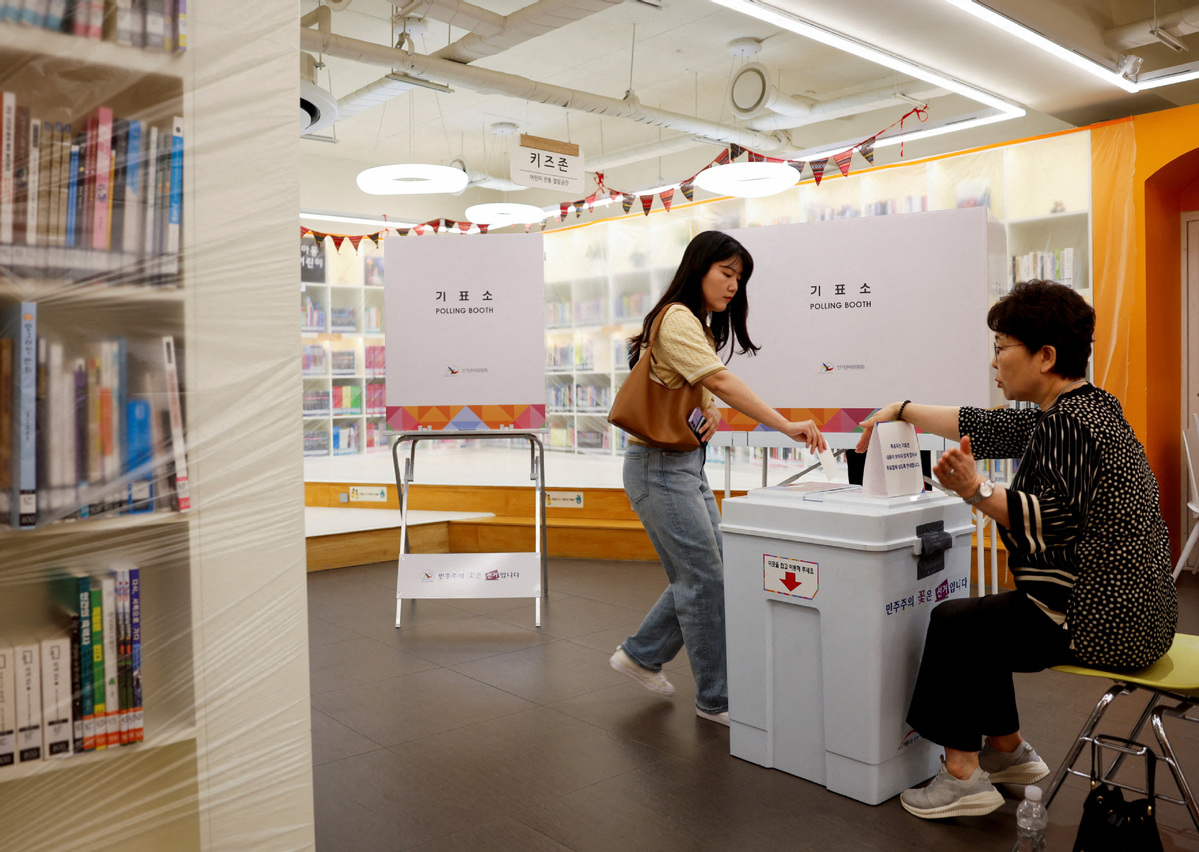
South Korea's snap presidential election began on Tuesday as voters head to the polls to end the country's six-month-long political vacuum in the aftermath of former president Yoon Suk-yeol's enforcement of martial law.
A total of 43.39 million eligible voters are able to vote from 6:00 am to 8:00 pm on Tuesday at 14,295 polling stations across the country.
As of 1 pm local time, the turnout for the 21st presidential election was tentatively tallied at 62.1 percent, according to data from the website of South Korea's National Election Commission.
It was slightly higher than the 61.3 percent record for the same period in the 2022 presidential election.
The snap election came exactly six months after Yoon made a martial law declaration that shocked the country. He was suspended from duty after being impeached by the parliament in December, and was ousted in April by the Constitutional Court.
The presidential race involves five candidates after two dropped out during the campaign. Key contenders include the Democratic Party's Lee Jae-myung and the People Power Party's Kim Moon-soo.
Lee Jae-myung is a presidential candidate for the second time. In 2022, he lost the presidential election to Yoon by 0.7 percentage point, the narrowest margin in South Korean history.
Kim is a former labor minister in the Yoon administration.
Born in 1985, Lee Jun-seok of the minor Reform Party is the youngest presidential candidate. He was a former PPP leader.
A winner is likely to emerge by around midnight, with the vote count to be completed around 6 am on Wednesday.
After the vote count is completed, the National Election Commission is expected to hold a meeting between 7 am to 9 am on Wednesday to formally approve the results, with the meeting to take around 5-10 minutes.
Since the snap election was caused by a leadership vacancy, the new president's term, without the usual two-month transition period, will begin as soon as the National Election Commission confirms the final voting results, according to South Korean broadcaster KBS World.
During the early voting on May 29-30, 34.74 percent of the 44.39 million eligible voters had cast their ballots.
In the presidential election in 2022, the final turnout was 77.1 percent.
SEOUL -- Lee Jae-myung, presidential candidate of South Korea's liberal Democratic Party, held a big lead of more than 10 percentage points over his archrival for the upcoming presidential election on June 3, a Flower Research survey showed Wednesday.
Lee won the support of 48.8 percent, leading Kim Moon-soo, presidential candidate of the conservative People Power Party, who garnered 37.7 percent.
The civil rights lawyer-turned-politician maintained his position as presidential frontrunner in the election, triggered by the removal of former conservative president Yoon Suk-yeol from office over his botched martial law imposition last December.
Lee lost the 2022 presidential election to Yoon by the country's narrowest margin of 0.73 percentage points.
Lee Jun-seok of the minor conservative New Reform Party, took 10.7 percent of support.
Early voting for the presidential by-election was scheduled to last for two days from Thursday.
The Democratic Party won an approval score of 47.1 percent, while 37.0 percent supported the People Power Party, the survey showed.
The result was based on a poll of 15,008 voters conducted between May 24 and May 27. It had a plus and minus 0.8 percentage points in margin of error with a 95 percent confidence level.
SEOUL - South Korea's police banned former prime minister Han Duck-soo, and Choi Sang-mok, former deputy prime minister for economic affairs, for alleged insurrection charges, multiple media outlets said on Tuesday.
Han and Choi have been under investigation as suspects of insurrection and prevented from leaving the country in the middle of this month.
The police special investigative unit summoned Han and Choi as well as Lee Sang-min, former interior minister who was prohibited from leaving the country last December, for questioning on Monday.
The three former government officials were suspected of being involved in the botched martial law bid by former president Yoon Suk-yeol, who was removed from office in April.
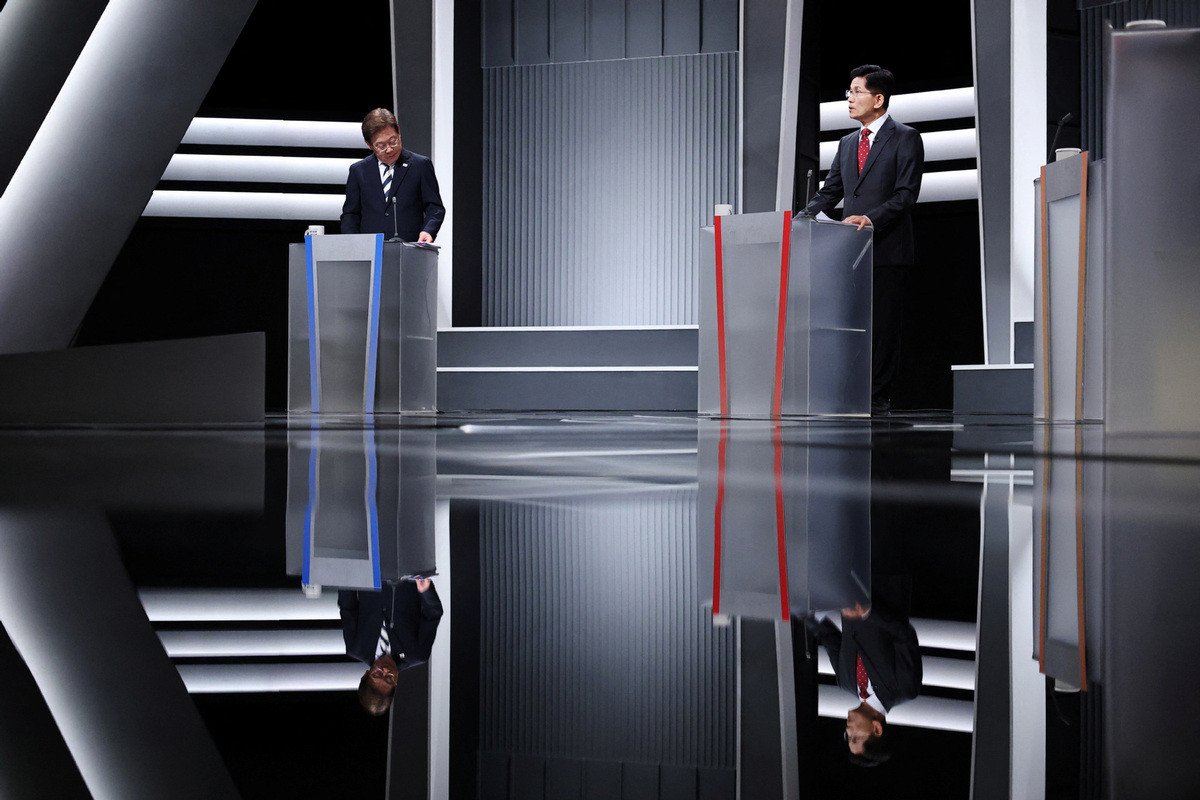
SEOUL — Political crisis in the Republic of Korea has ignited bipartisan calls for constitutional amendments to reshape the powers of the president, an issue hotly debated ahead of the June 3 snap election.
The election was called after former president Yoon Suk-yeol was impeached and removed from office over his shock martial law decree in December, and contenders from the major parties have vowed to pursue constitutional reforms.
"Chances to succeed in a constitutional amendment are higher than ever," said Chae Jin-won, a professor at Kyunghee University's Institute of Public Governance.
The constitution was last revised in 1987 to introduce direct presidential elections and a single, five-year term. Changes have long been debated but never implemented.
Front-runner Lee Jae-myung, of the liberal Democratic Party, has proposed four years in office and two consecutive terms for presidents who would take office from 2030 and onward, a run-off system for presidential elections and parliamentary nomination on the prime minister.
"The responsibility of the president should be strengthened and powers should be decentralized," he said on May 18.
Kim Moon-soo, presidential nominee from the conservative People Power Party, has also unveiled a reform proposal, including a four-year, two-term presidential system for future presidents.
In recent years, presidential candidates from across the political spectrum have supported revisions, including giving presidents two four-year terms, but there have been few concrete steps after new leaders were chosen.
At the time, Lee said ending the political turmoil was the top priority.
Lee led a poll for the snap presidential election on June 3, Flower Research survey showed on Monday.
Also on Monday, Lee vowed to restore communication channels with the Democratic People's Republic of Korea, or DPRK.
Lee announced his foreign security policy, saying he would push for the restoration of inter-Korean communication channels.
Agencies - Xinhua
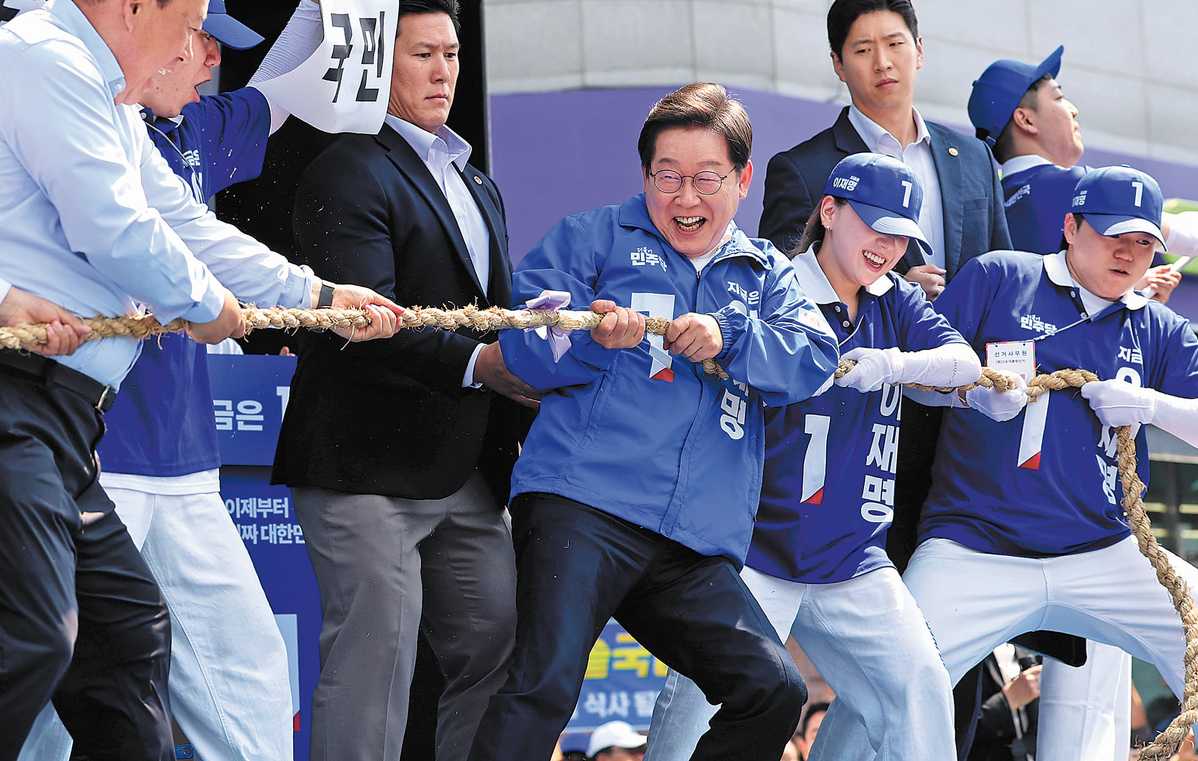
SEOUL — South Korean presidential front-runner Lee Jae-myung said on Sunday the deadline to reach a deal with the US on trade tariffs needs to be reconsidered to find a mutually beneficial agreement between the two countries.
Tariff negotiations with the United States will be one of the biggest challenges for the winner of the June 3 election, Lee told a news conference.
The snap election was called after Yoon Suk-yeol was impeached as president and removed from office for briefly declaring martial law in December. Lee, from the main opposition Democratic Party of Korea, is leading in opinion polls over presidential contestants.
Seoul and Washington have said they aim to craft a package on tariffs and economic cooperation by July 8. But the South Korean minister of trade and industry said recently there was not enough time and delays would be possible due to the election.
"There is not much time," Lee said. "Isn't diplomacy something that benefits both sides? If one country benefits and the other country suffers unilaterally, that is not diplomacy. It is called plunder."
He called for mutual respect between the two countries, saying they "need to reconsider whether the timeline set by one side should be bound to".
Lee said South Korea must compile an extra budget to boost the economy in the short term and vowed that if elected he would form and head a task force to tackle the slowing economy.
"I will swiftly prepare immediately actionable economic measures and actively respond to the domestic economic slowdown with the determination to fight the recession," he said.
"We should maintain and strengthen our powerful defense capabilities, military power and strengthen the South Korea-US security alliance, but find a path toward dialogue, cooperation, communication and coexistence where possible," said Lee, who considers pragmatism as a key to diplomacy.
Lee is leading the race with 45 percent support ahead of conservative rival Kim Moon-soo, Yoon's labor minister, with 36 percent support in a Gallup Korea poll released on Friday.
Kim has been closing the initially double-digit gap with Lee. Asked about his recent decline in polls, Lee said he was confident that South Koreans would not choose those who supported or staged the "insurrection", referring to the criminal charges against Yoon over martial law.
Agencies Via Xinhua
